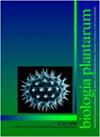植物耐寒性的转录组学和蛋白质组学机制
IF 0.9
4区 生物学
Q4 PLANT SCIENCES
引用次数: 1
摘要
亮氨酸激活剂过氧化氢酶;C-环结合C-环结合因子/脱水-钙调神经磷酸酶B-样糖蛋白;鸣谢:本研究的利益冲突:作者声明,他们没有已知的竞争性经济利益或个人关系,这些利益或关系可能会影响本文报道的工作。摘要非生物胁迫是全球作物生产面临的主要挑战之一。低温引起的非生物胁迫是作物生产的主要限制,尤其是在世界温带地区。冷胁迫不仅影响作物发育和产量,而且限制了农产品在全球范围内的有效分配。了解抗寒性的分子机制对于制定控制作物损失和提高产量的策略至关重要。在这篇综述中,我们探讨了植物抗寒性的主要分子机制,包括最近发现的相关基因网络和作物冷胁迫适应的调控机制。此外,我们强调了蛋白质组学在发现参与关键信号通路的蛋白质中的作用,包括胚胎发生后期丰富的蛋白质、防冻蛋白、冷调节蛋白、热休克蛋白和发病机制相关蛋白。讨论了这些蛋白质的作用及其在生理生化反应中的相对丰度,并提出了植物遗传增强的关键候选蛋白质。本文章由计算机程序翻译,如有差异,请以英文原文为准。
Transcriptomic and proteomic mechanisms underlying cold tolerance in plants
leucine activator catalase; C-repeat binding C-repeat binding factor/dehydration- calcineurin B-like glycoproteins; Acknowledgements : The present study Conflict of interest : The authors declare that they have no known competing financial interests or personal relationships that could have appeared to influence the work reported in this paper. Abstract Abiotic stress is one of the major challenges facing crop production globally. Abiotic stress resulting from low temperature is a major limitation to crop production, especially in the temperate regions of the world. Cold stress not only influence crop development and reduce yields, but also curtail the efficient distribution of agricultural products worldwide. An understanding of the molecular mechanisms underlying cold stress tolerance is important for the development of strategies to manage crop loss and improve yield. In this review, we explore the major molecular mechanisms involved in plant cold tolerance, including recent discoveries on interrelated gene networks and regulatory mechanisms for cold stress adaptation in crops. Further, we highlight the role of proteomics in the discovery of proteins involved in key signaling pathways, including late embryogenesis-abundant proteins, antifreeze proteins, cold-regulated proteins, heat shock proteins, and pathogenesis-related proteins. The role of these proteins, and their relative abundance in physiological-biochemical reactions, are discussed and key candidate proteins for plant genetic enhancement are suggested.
求助全文
通过发布文献求助,成功后即可免费获取论文全文。
去求助
来源期刊

Biologia Plantarum
生物-植物科学
CiteScore
2.80
自引率
0.00%
发文量
28
审稿时长
3.3 months
期刊介绍:
BIOLOGIA PLANTARUM is an international journal for experimental botany. It publishes original scientific papers and brief communications, reviews on specialized topics, and book reviews in plant physiology, plant biochemistry and biophysics, physiological anatomy, ecophysiology, genetics, molecular biology, cell biology, evolution, and pathophysiology. All papers should contribute substantially to the current level of plant science and combine originality with a potential general interest. The journal focuses on model and crop plants, as well as on under-investigated species.
 求助内容:
求助内容: 应助结果提醒方式:
应助结果提醒方式:


